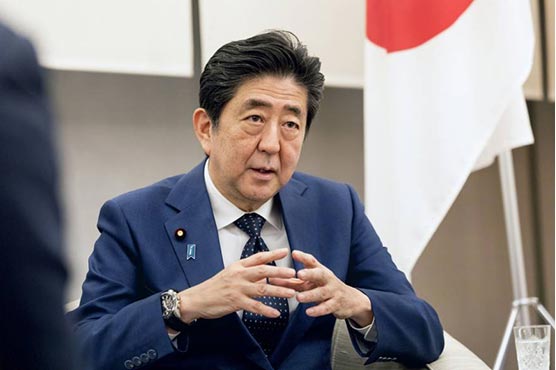Japan's Abe shakes up cabinet, brings in rising star

Japan PM picks new foreign, defence ministers in reshuffle
TOKYO (AFP) - Japan’s Shinzo Abe on Wednesday appointed new foreign and defence ministers and promoted a popular rising political star, in a cabinet reshuffle that fuelled speculation over the prime minister’s successor.
The spectacular appointment as environment minister of the telegenic Shinjiro Koizumi, the 38-year-old son of much-loved former PM Junichiro Koizumi, set tongues wagging in Tokyo political classes as the Abe era draws to a close.
"Abe intends to start an open race to pick the next prime minister or even the one after that," said SMBC Nikko Securities chief market economist Yoshimasa Maruyama.
A darling of the Japanese media, Shinjiro Koizumi received blanket coverage for his recent marriage to television broadcaster Christel Takigawa, which was announced at the prime minister’s office.
He is the third-youngest minister appointed to the cabinet in Japan since the end of World War II, in a country when seniority is prized in politics and many other walks of life.
Despite intense media spotlight, he has been coy on expressing his view on the issues of the day and there will be close scrutiny over his policies on nuclear power, particularly on whether he will break with his father’s anti-nuclear stance.
Abe is set to become Japan’s longest-serving prime minister in November but is expected to step down at the Liberal Democratic Party (LDP) leadership election in 2021 and the jostling for position is already beginning.
Japan’s new foreign minister is Toshimitsu Motegi, who was promoted as a reward for his work in negotiating a trade deal with the United States.
Outgoing foreign minister Taro Kono was shifted to the defence portfolio, in a move seen as reinforcing Tokyo’s hard line towards South Korea at a time of worsening ties between the two neighbours.
Kono, who has amused commentators by interacting with people on social media -- even offering relationship advice at times -- struck a hard line during the recent spat with Seoul that has infected their trade and security ties.
Motegi, 63, is a Harvard-educated political veteran who worked as a McKinsey consultant before winning a lower house seat in 1993.
Analysts do not expect the shake-up to herald significant changes to Japan’s diplomatic policy, which is managed largely by the prime minister’s office.
But it may also put Motegi in the starting blocks in the race to succeed Abe, noted Tobias Harris, an expert on Japanese politics at consultancy Teneo.
Speed skating Olympics minister
Abe retained the services of his trusted associate Taro Aso as deputy prime minister and finance minister, as well as Yoshihide Suga as the powerful chief cabinet secretary.
The PM also kept key allies and aides within the cabinet and top layers of the party to shore up his position for the next two years.
The Abe government is poised to hike its consumption tax from eight percent to 10 percent on October 1, amid fears this could act as a brake on the world’s third-largest economy.
He is also hoping to achieve his long-cherished ambition of amending Japan’s post-war constitution to change the status of the country’s Self Defense Forces.
Abe also kept LDP Secretary General Toshihiro Nikai, who has deep contacts in China, as Japan prepares for an expected state visit by Xi Jinping in 2020.
Among other key figures are former Olympic speed skater Seiko Hashimoto, who became the latest in a string of Olympic ministers ahead of the 2020 summer Games.
Hashimoto is one of just two women out of 19 in the new cabinet despite Abe’s much-heralded "womenomics" programme. His previous cabinet included just one woman.
Japan ranked 125th in the 2018 World Economic Forum’s Gender Gap Report in terms of women’s political empowerment.
The other woman is Sanae Takaichi, appointed as interior minister. She is seen as a hard-right nationalist, who regularly visits the Yasukuni shrine housing war criminals that enrages South Korea and China.
During her previous stint as interior minister, she threatened to cut off TV news stations over perceived unfriendly coverage.

